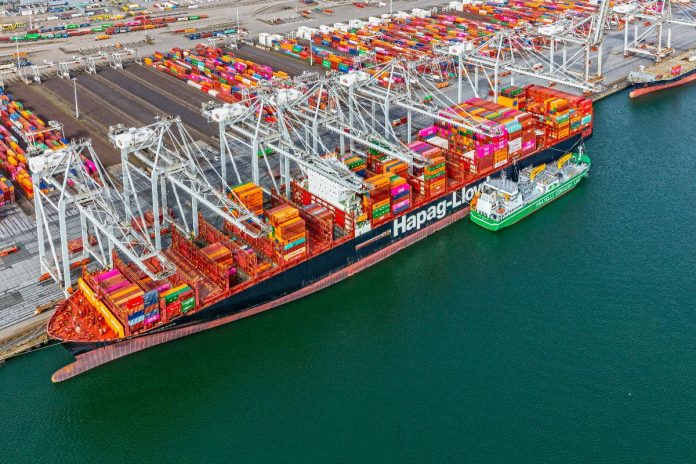Titan Clean Fuels, a major supplier of liquefied natural gas (LNG) and liquefied biomethane (LBM) to maritime clients, along with STX Group, a global leader in environmental commodities trading and climate solutions, have announced the successful completion of a ship-to-ship bunkering operation.
This involved delivering 2,200 metric tons of LBM to a Hapag-Lloyd container vessel in the port of Rotterdam. This event signifies Hapag-Lloyd’s inaugural use of LBM as an eco-friendly shipping fuel, making it the largest ship-to-ship bunkering operation of its kind.
Furthermore, STX Group and Titan Clean Fuels have collaborated to liquefy, store, and distribute mass-balanced biomethane in Zeebrugge, Belgium, adhering to ISSC certification, which is fully compliant with the European Union’s Renewable Energy Directive, also known as RED II.
“This pioneering deal demonstrates that bunkering large quantities of liquefied Biomethane is possible and scalable. However, there is still more progress required regarding the necessary infrastructure and the regulatory framework. For us, bunkering liquefied Biomethane is another measure in our step-by-step approach to further decarbonise our operations to reach our goal of becoming net-zero by 2045,” said Jan Christensen, senior director of Fuel Purchasing at Hapag-Lloyd.
Liquefied biomethane (LBM), also referred to as bio-LNG, is a well-established eco-friendly bunker fuel that can achieve net-zero emissions depending on the source material. It is available in commercial markets across Europe, Asia, and North America. Biomethane is derived from sustainable biomass sources like industrial and agricultural waste streams, ensuring it does not compete with food production. The regulations governing its production and use are defined at national or regional levels, such as the EU’s RED II directive in Europe and the EPA’s Renewable Fuel Standards in the USA.
LBM can be supplied either as physical molecules or through a “Mass-balanced” approach. In this method, biomethane is injected into the gas network and transported to liquefaction plants and LNG terminals via existing infrastructure, using a system of mass balancing. Mass balancing is anticipated to become a common feature in various alternative fuel pathways, providing a practical means to meet the shipping industry’s demand for large volumes of clean marine fuel.
“Titan’s Alice Cosulich bunker vessel has successfully delivered LBM to Hapag-Lloyd’s Brussels Express container ship. We’d like to thank all the partners involved for another smooth operation. We have been encouraged by the demand for LBM so far, and this major bunkering represents a significant step in shipping’s clean fuels transition. Titan recognizes the LNG pathway via LBM and renewable e-methane as a practical, sustainable and cost-effective route to net-zero shipping emissions available today. We work every day towards full regulatory compliance for shipowners and operators of deep-sea ships,” commented Caspar Gooren, director of Renewable Fuels at Titan Clean Fuels.







